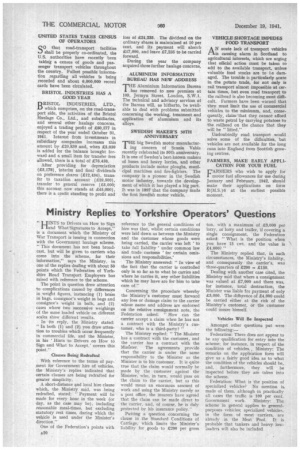Ministry Replies to Yorkshire Operators' Questions
Page 22

If you've noticed an error in this article please click here to report it so we can fix it.
'HINTS to Drivers on How to Sign 1 land WhatSignatures to Accept,is a document which the Ministry of War Transport is issuing in connection with the Government haulage scheme. " This document has not been broadcast, but will be given to carriers who • come into the scheme, for their information," says the Ministry, in one of the replies dealing with about 50 points which the Federation of Yorkshire Road Transport Employers has raised with reference to the scheme.
The point in question drew attention to complications caused by differences in weight figures, instancing (1) brass in bags, consignor's weight in bags and consignee's weight in bulk, and (2) cases where two successive weighings of the same loaded vehicle on different scales show different results.
In its reply, the Ministry stated: " In both (1) and (2) you draw attention to troubles which occur frequently in commercial life, and the Minister, in his ' Hints to Drivers on How to Sign and What to Accept,' covers this point."
Clauses Being Redrafted
With reference to the terms of pay' ment for Government hire of vehicles, the Ministry's replies indicated that certain clauses are being redrafted for greater simplicity_ A short-distance 4nd local hire clause which, the Ministry said, was being redrafted, stated: " Payment will be made for every hour in the week (or day, as the case may be) , including reasonable meal-times, but excluding statutory rest times, during which the vehicle is used under the Minister's direction."
One of the Federation's points with
reference to the general conditions of hire was that, whilst certain conditions were laid down as between the Ministry and the customer whose goods were being carried, the carrier was left 'to take full liability' under common law and trade customs 'for certain omissions and responsibilities.'
The Ministry answered: "In view of the fact that the carrier is controlled only in so far as to what he carries and where he carries it, any other liabilities which he may have are for him to take care of."
Concerning the procedure whereby the Ministry's customer must forward any loss or damage claim to the carrier whose name and address are endorsed on the relative consignment note, the Federation asked: " How can the carrier accept a claim when he has not a contract with the Ministry's customer, who is a third-party? "
The Ministry replied: " The Miaister has a contract with the customer, and the carrier has a contract with the Minister. The agreements provide that the carrier is under the same responsibility to the Minister as the Minister is to his customer. It is quite true that the claim would normally be made by the customer against the Minister, who, in turn, would pass on the claim to the carrier, but as this would mean an enormous amount of work and using the Ministry merely as a post office, the insurers have agreed that the claim can be made direct to the carrier, and, of course, he is duly protected by his insurance policy."
Putting a question concerning the clause in the Standard Conditions of Carriage, which limits the Minister's liability for goods to £200 per gross ton, with a maximum of £3,000 per lorry, or lorry and trailer, if covering a single consignment, the Federation asked: "What is the position when you have 15 cwt. and the value is £4,000? "
The Ministry replied that, in such circumstances, the Ministry's liability, and consequently the carrier's, was three-quarters of £200 ss £150.
Dealing with another case cited, the Ministry said that where a consignment was valued at £7,000 and there was, for instance, total destruction, the Minister was liable for payment of only £3,000. The difference of £4,000 could be carried either at the risk of the Ministry's customer, or the customer could insure himself.
Vehicles Will Be Inspected
Amongst other questions put were the following:— Federation: There does not appear to be any qualification for entry into the scheme; for instance, in respect of the condition of vehicles., Ministry: The remarks on the application form will give us a fairly good idea as to what the condition of the vehicles should be, and, furthermore, they will be inspected before they are taken into the scheme.
Federation: What is the position of specialized vehicles? No mention is. made of them, although in practically all cases the traffic is 100 per cent. Government work. Ministry: The scheme in general applies to generalpurposes vehicles; specialized vehicles, in the form of meat carriers, are already in the Meat Pool, It is probable that tankers and heavy, lowloaders will also be included
























































